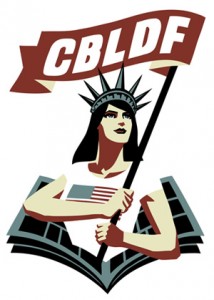 CBLDF is among a group of booksellers and publishers who secured a preliminary injunction against a new Louisiana law that requires websites to age-verify every Internet user before providing access to non-obscene material that could be deemed harmful to any minor. Judge Brian A. Jackson of the federal district court in Baton Rouge ruled in Garden District Book Shop, Inc.v. Stewart that the plaintiffs demonstrated they are likely to prevail on their claims that the law violates the First Amendment and is unconstitutionally vague. Comic Book Legal Defense Fund is one of the plaintiffs in the case.
CBLDF is among a group of booksellers and publishers who secured a preliminary injunction against a new Louisiana law that requires websites to age-verify every Internet user before providing access to non-obscene material that could be deemed harmful to any minor. Judge Brian A. Jackson of the federal district court in Baton Rouge ruled in Garden District Book Shop, Inc.v. Stewart that the plaintiffs demonstrated they are likely to prevail on their claims that the law violates the First Amendment and is unconstitutionally vague. Comic Book Legal Defense Fund is one of the plaintiffs in the case.
The lawsuit was brought by Media Coalition and the American Civil Liberties Union on behalf of two independent bookstores, Garden District Book Shop and Octavia Books; Future Crawfish Paper LLC, publisher of Anti-Gravity magazine; the American Booksellers Association; and CBLDF.
The law, enacted as H.B. 153, requires that “any person or entity in Louisiana that publishes material harmful to minors on the Internet shall, prior to permitting access to the material, require any person attempting to access the material to electronically acknowledge and attest that the person seeking to access the material is eighteen years of age or older.” A failure to age-verify, even if no minor ever tries to access the material, is a crime that could lead to a $10,000 fine. Louisiana has a separate law that makes it a crime to lie when asked to acknowledge or attest to anything.
To comply with the law, booksellers and magazine publishers must either place an age confirmation button in front of their entire website, thereby restricting access to materials that may be appropriate for all ages, or attempt to review all of the books or magazines available at their website and place an age confirmation button in front of each individual page that might be inappropriate for any minor.
The law violates the First Amendment rights of older minors as well as adults. Courts have held that older minors have a right to purchase books that deal with the subject of sex that are not appropriate for younger minors. However, the Louisiana law bars anyone under 18 from accessing “harmful” material. If a retailer places an age verification page at the front of a website, it would effectively bar all minors from buying all books.
The federal district court found that “[t]he ill-defined terms in [H.B. 153] do not adequately notify individuals and businesses in Louisiana of the conduct it prohibits, which creates a chilling effect on free speech.”
“This is an important victory for me as a bookseller and for my customers,” said Tom Lowenberg, co-owner of Octavia Books. “This law would have placed an impossible burden on our website by forcing us to ‘ID’ every person who visited the site before allowing them to browse our books or risk getting a$10,000 fine.”
“I’m very relieved by the decision. This law would have had a definite chilling effect on our business, depriving our customers of books that they have a First Amendment right to browse and buy,” said Britton Trice, owner of Garden District Book Shop.
“We are thankful for the court’s ruling to block the state from enforcing this law that would have forced booksellers and publishers to restrict access of their customers and readers on their online stores to what is acceptable for a 12-year-old,” said David Horowitz, executive director of Media Coalition. “The court agreed that parental controls are a more effective and less restrictive way for parents to limit their kids’ access to sexual material on the Internet without violating the constitutional rights of adults and older minors.”
“The court’s decision is a welcome recognition that the law’s online age-verification requirements impose burdens on publishers and speakers and create a chilling effect on the exercise of free speech rights,” said Esha Bhandari, a staff attorney with the ACLU’s Speech, Privacy, and Technology Project.
The lawsuit also claims that the age-verification law is unconstitutionally vague, violates the equal protection clause of the Fourteenth Amendment, the Due Process Clause of the Fifth Amendment and the Commerce Clause of the U.S. Constitution.
Plaintiffs are represented by the Lee Rowland and Esha Bhandari of the national ACLU, Candice Simon and Stephen Dixon of the ACLU of Louisiana, and Michael A.Bamberger and Richard M. Zuckerman of the law firm Dentons US LLP, general counsel to Media Coalition, Inc.
Help support CBLDF’s important First Amendment work in 2016 by visiting the Rewards Zone, making a donation, or becoming a member of CBLDF!